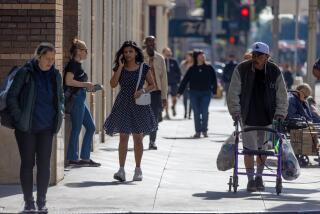Judge Blocks Law Limiting Welfare Aid
Saying a new California policy may have violated the constitutional rights of poor people, a federal judge temporarily stopped the state from restricting the benefits paid to welfare recipients who move here from other states.
The order by U.S. District Judge Milton Schwartz of Sacramento blocks implementation of a new law proposed by Gov. Pete Wilson and approved by the Legislature that was designed to prevent California from attracting poor people from other states. It went into effect Dec. 1.
In proposing the legislation, Wilson argued that California was becoming a welfare magnet because the benefits it pays under the Aid to Families with Dependent Children (AFDC) are generally higher than those of most other states. He said his proposal would discourage migration here and help the state ease its budget burdens.
The law requires that for their first year of residency in California, welfare recipients can only receive benefits at the levels paid by their previous home state.
In his order, which remains in effect until another court hearing on Jan. 7, Schwartz said those residency requirements may violate the constitutional guarantees of equal protection under the law and the right to travel.
He said the argument that the law was causing undue hardship to some poor families also “tips sharply in plaintiffs’ favor.”
The order, issued after a two-hour closed-door hearing, was a victory for the American Civil Liberties Union (ACLU) which had filed a class-action lawsuit against the state on behalf of a family from Louisiana receiving $190 in monthly benefits. The California AFDC benefit for the same-size family--a mother and two children--is $624 a month.
“(This) means at a minimum that several thousand people are not going to be homeless because of this order,” said Mark Rosenbaum, general counsel to the ACLU Foundation of Southern California. “It means that families are going to be spared misery and grief and homelessness.”
Rosenbaum was joined in the lawsuit by the Legal Aid Society of San Mateo County and the Coalition of California Welfare Rights Organizations.
Amy Albright, a spokeswoman for the state Department of Social Services, which administers California’s welfare program, estimated that about 2,000 families will be affected by the order. She said they will now be paid the California welfare rate when the next AFDC checks go out at the first of the year.
Albright said the Wilson Administration will continue to defend the new law when U.S. District Judge David F. Levi holds a hearing Jan. 7 on Rosenbaum’s request for a permanent injunction. At stake for the state, she said, is about $15 million in additional welfare costs.
More to Read
Start your day right
Sign up for Essential California for news, features and recommendations from the L.A. Times and beyond in your inbox six days a week.
You may occasionally receive promotional content from the Los Angeles Times.






